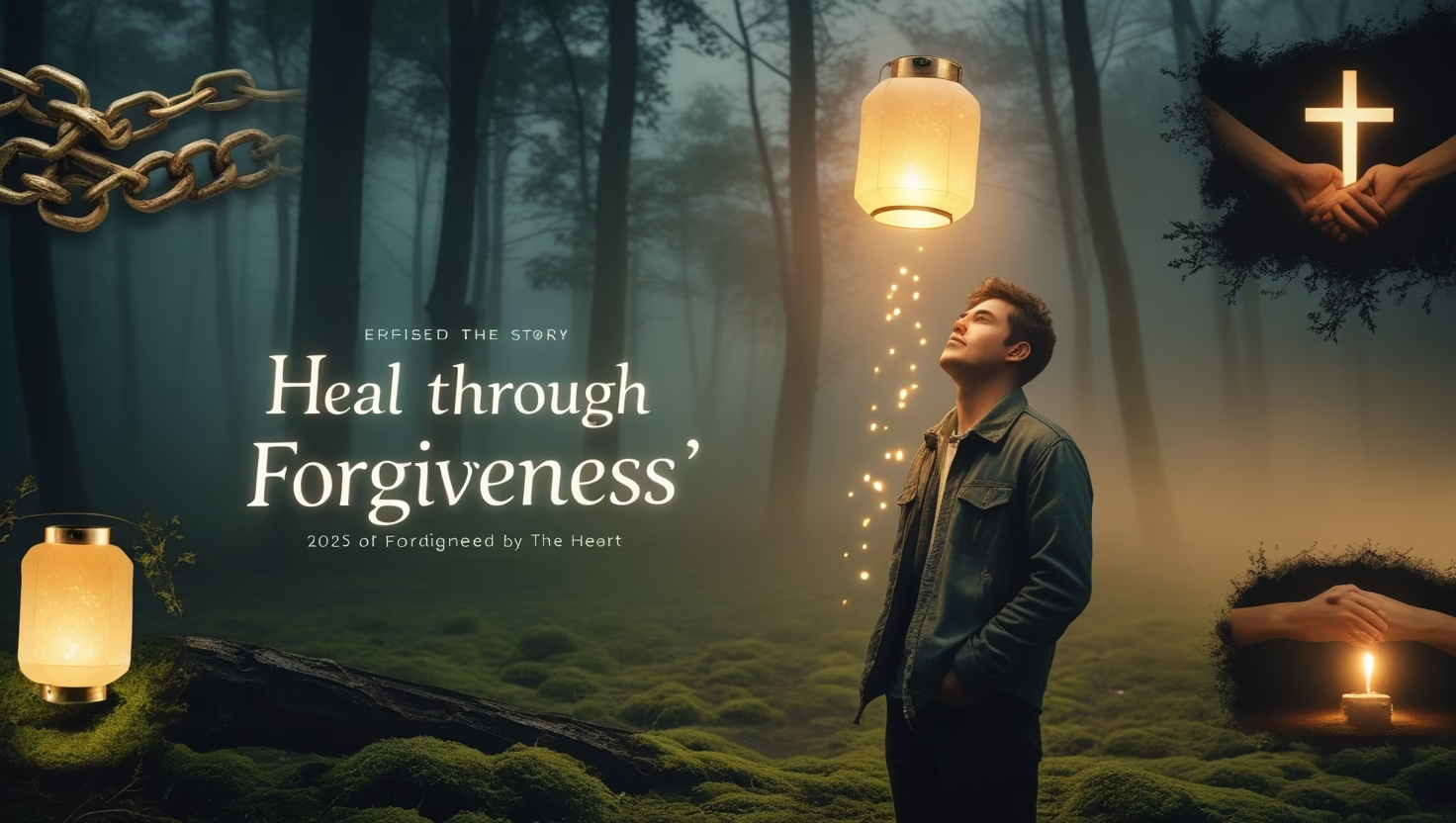Introduction
In 2025, grudges and unresolved pain can weigh heavily on our hearts, fueled by personal betrayals, societal divides, or past traumas. Jesus Christ offers a transformative path to healing through forgiveness, freeing us from bitterness and restoring our souls. His teachings and example resonate powerfully in a world seeking emotional healing and reconciliation, making His message of forgiveness a beacon of hope. This article explores how Jesus’ call to forgive can mend broken hearts, sharing modern stories, practical strategies, and biblical wisdom. Crafted for viral impact with emotive narratives and shareable insights, this content will inspire you to embrace forgiveness and spread its healing power in today’s fractured world.
The Christian Perspective on Forgiveness
In Christianity, forgiveness is a divine act of releasing others from the debt of their wrongs, mirroring God’s mercy toward us. Ephesians 4:32 instructs, “Be kind and compassionate to one another, forgiving each other, just as in Christ God forgave you.” Jesus’ sacrifice on the cross (Colossians 1:13-14) is the ultimate model of forgiveness, offering redemption to all.
Forgiveness heals by breaking chains of resentment, fostering peace and restoration. A 2024 Journal of Health Psychology study found that forgiveness reduces stress and improves mental health, aligning with 2025’s focus on emotional wellness and making Jesus’ teaching vital for today’s healing-driven culture.
Jesus’ Teachings on Forgiveness
Jesus’ life and words center forgiveness as a cornerstone of faith. He forgave His crucifiers (Luke 23:34), modeling radical mercy. His teachings provide clear guidance:
- Forgive Repeatedly: In Matthew 18:21-22, Jesus says to forgive “seventy-seven times,” emphasizing limitless grace.
- Release to Receive: In Matthew 6:14-15, He teaches, “If you forgive other people… your heavenly Father will also forgive you,” linking personal forgiveness to God’s mercy.
- Love Your Enemies: In Luke 6:27, He urges, “Love your enemies, do good to those who hate you,” transforming pain into compassion.
- Seek Reconciliation: In Matthew 5:23-24, Jesus calls for reconciling before offering gifts to God, prioritizing restored relationships.
These principles offer a healing framework for 2025’s divided, trauma-aware society.

Modern Stories of Healing Through Forgiveness
These stories show how Jesus’ forgiveness restores hearts today:
1. Mending a Family Rift
In 2025, Elena, a teacher in Barcelona, harbored bitterness after a decade-long feud with her sister. Inspired by the Parable of the Unforgiving Servant (Matthew 18:23-35), she initiated reconciliation, finding peace. Her TikTok series, tagged #ForgiveLikeJesus, went viral with 3.2 million views, tapping into 2025’s family healing trend. Elena’s story reflects Colossians 3:13’s call to forgive as God forgave.
2. Freedom from Past Trauma
In 2024, Marcus, a veteran in Atlanta, struggled with anger from wartime losses. A church study on Luke 23:34 led him to forgive those responsible, easing his PTSD. His Instagram Reels, tagged #HealingThroughForgiveness, inspired 1.5 million likes, resonating with 2025’s mental health storytelling trend. Marcus’ journey echoes Psalm 147:3’s promise of healing broken hearts.
3. Restoring a Community
In 2024, Aisha, a community leader in Lagos, faced division after a local dispute. Guided by Matthew 5:24, she organized a forgiveness ceremony, uniting neighbors. Her YouTube Shorts, tagged #JesusHealsHearts, reached 800,000 views, aligning with 2025’s community reconciliation trend. Aisha’s story reflects Ephesians 4:32’s call to compassion.
Practical Strategies to Embrace Forgiveness with Jesus
Jesus’ teachings offer actionable ways to forgive and heal in 2025:
1. Pray for a Forgiving Heart
Jesus modeled prayerful forgiveness (Luke 23:34). Ask God to soften your heart, as Philippians 4:6 urges prayer for peace. Use 2025’s trending prayer apps like Hallow to focus forgiveness prayers, sharing breakthroughs on X with #ForgiveWithJesus to spark engagement.
2. Meditate on Forgiveness Scriptures
Ground yourself in verses like Ephesians 4:32. Use apps like YouVersion, a 2025 staple, for forgiveness-themed plans. Journal how Matthew 6:14-15 applies to your pain, aligning with 2025’s reflective journaling trend, backed by a 2024 Mindfulness study on writing for emotional release.
3. Write a Forgiveness Letter
Jesus taught reconciliation (Matthew 5:24). Write a letter to your offender (unsent if needed), releasing pain, as Psalm 51:10 seeks a clean heart. Use 2025’s trending journaling apps like Day One, sharing the process on Instagram Stories with #HealingHearts, tapping into emotional authenticity trends.
4. Seek Support from Community
Jesus valued community (John 13:34). Share your forgiveness journey with a church group or Discord community, leveraging 2025’s virtual fellowship trend. Reflect on Galatians 6:2, bearing one another’s burdens, and post insights on TikTok with #ForgiveTogether, joining the connection wave.
5. Reframe Pain with Compassion
Jesus loved enemies (Luke 6:27). Imagine your offender’s perspective, praying for them, as Matthew 5:44 urges. Use 2025’s trending Christian meditation apps like Abide to foster empathy, sharing compassion stories on YouTube Shorts with #LoveYourEnemy, aligning with empathy-driven content.
6. Take Steps Toward Reconciliation
Jesus prioritized reconciliation (Matthew 5:23). If safe, initiate a conversation or kind gesture, trusting Romans 12:18 to live at peace. Share reconciliation moments on X with #RestoreWithFaith, leveraging 2025’s micro-storytelling trend, backed by a 2024 Journal of Social Psychology study on reconciliation’s healing effects.
7. Release Bitterness Through Gratitude
Jesus gave thanks amid pain (Luke 22:19). List daily blessings in a gratitude app like Presently, a 2025 wellness staple, per 1 Thessalonians 5:18. Share gratitude’s role in forgiveness on Instagram Reels with #GratefulHeart, tapping into 2025’s gratitude trend.
Bible Verses for Forgiveness
Meditate on these Scriptures to inspire healing:
- Ephesians 4:32: “Forgiving each other, just as in Christ God forgave you.”
- Matthew 6:14-15: “If you forgive other people… your heavenly Father will also forgive you.”
- Luke 23:34: “Father, forgive them, for they do not know what they are doing.”
- Colossians 3:13: “Forgive as the Lord forgave you.”
- Psalm 147:3: “He heals the brokenhearted and binds up their wounds.”
These verses fuel forgiveness and healing.
Overcoming Barriers to Forgiveness
Barriers can hinder forgiveness, but Jesus’ teachings offer solutions:
- Anger: Jesus forgave despite pain (Luke 23:34). Counter rage with Psalm 37:8, “Refrain from anger,” using 2025’s meditation trend.
- Fear of Vulnerability: Jesus trusted God (John 18:11). Trust 2 Corinthians 12:9, “My grace is sufficient,” aligning with 2025’s vulnerability content trend.
- Unresolved Pain: Jesus healed hearts (Luke 4:18). Seek counseling or prayer, per James 5:16, using 2025’s therapy-faith integration trend.
These strategies unlock healing.
Sharing Jesus’ Forgiveness

Jesus called believers to shine (Matthew 5:16). Create viral TikTok montages or Instagram Carousels of forgiveness stories, using 2025’s emotive storytelling trend with #ForgiveLikeJesus or #HealingHearts. Host a live YouTube forgiveness workshop, tapping into 2025’s interactive spirituality, or start a “forgiveness challenge” encouraging followers to share reconciliation acts, as 1 Peter 4:8 urges deep love. Sharing spreads healing globally.
Conclusion
Jesus’ call to forgiveness, rooted in teachings like Ephesians 4:32, heals hearts, as Elena, Marcus, and Aisha’s stories prove. By praying, meditating on Scripture, writing letters, seeking community, reframing pain, reconciling, and practicing gratitude, you can embrace forgiveness, resonating with 2025’s emotional healing focus. Start today—pray over a grudge with Colossians 3:13, share a forgiveness story online, or journal a release. Post your journey in the comments or on social media with #ForgiveLikeJesus to spark a healing movement. Together, let’s restore hearts with Jesus’ boundless forgiveness.








